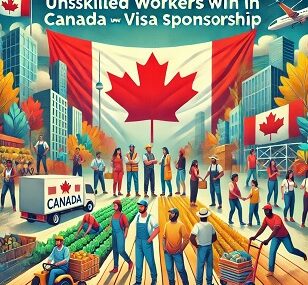Australia Visa Sponsorship Jobs for Africans 2025/2026
Introduction
Australia continues to rank among the world’s top destinations for skilled and semi-skilled migrants, and the 2025/2026 period presents one of the most open opportunities yet for Africans seeking visa sponsorship jobs. With its thriving economy, labor shortages in key sectors, and an increasingly inclusive immigration policy, Australia is actively welcoming foreign professionals particularly from Africa to fill workforce gaps and support national development.
This comprehensive guide explores Australia’s visa sponsorship system, available job categories, qualification requirements, official programs, salary structures, migration pathways, benefits, challenges, and real-world tips for Africans aspiring to live and work legally in Australia. The tone is practical, academic yet conversational, and the content is designed for workers, students, and families planning a long-term relocation.
Understanding Visa Sponsorship in Australia
Visa sponsorship means that an Australian employer is officially recognized by the government to hire foreign workers and support their visa application. This sponsorship allows the worker to live, work, and sometimes bring dependents to Australia.
In essence, the employer becomes your legal sponsor, confirming that your skills are needed in their business and that no Australian citizen or permanent resident is available to fill the role. This process is tightly regulated by the Australian Department of Home Affairs to prevent labor exploitation and ensure fair opportunities.
For Africans, visa sponsorship offers not only legal migration but also a clear path to permanent residency, competitive salaries, and career advancement in a well-regulated economy.
Why Australia Needs African Workers
Australia’s population growth has slowed in recent years, and the country faces major skill shortages across various industries particularly healthcare, engineering, construction, IT, and agriculture.
Meanwhile, Africa boasts a rapidly growing, skilled labor force energetic professionals trained in medicine, technology, education, and trades. Recognizing this, the Australian government has expanded its Skilled Migration Program and encouraged employers to sponsor international candidates.
Africans from Nigeria, Ghana, Kenya, South Africa, Egypt, Uganda, and Zimbabwe are among the most actively recruited in recent years.
Key reasons Australia seeks African professionals include:
-
Africa’s high English proficiency (especially from Anglophone countries)
-
Strong educational qualifications
-
Proven work ethics and adaptability
-
Availability in high-demand occupations
Australia Visa Sponsorship Jobs for Africans 2025/2026
Visa Categories for Sponsorship in 2025/2026
Below are the main visa sponsorship routes open to Africans in 2025 and 2026.
| Visa Type | Description | Duration | Pathway |
|---|---|---|---|
| Temporary Skill Shortage (TSS) Visa – Subclass 482 | For skilled workers sponsored by approved employers to fill specific shortages. | Up to 4 years | May lead to permanent residency |
| Employer Nomination Scheme (ENS) Visa – Subclass 186 | Permanent visa for skilled workers nominated by Australian employers. | Permanent | Direct PR pathway |
| Regional Sponsored Migration Scheme (RSMS) Visa – Subclass 187 | For workers in regional areas with employer sponsorship. | Permanent | Encourages regional relocation |
| Skilled Employer Sponsored Regional (Provisional) Visa – Subclass 494 | For skilled migrants working in regional Australia. | 5 years | Eligible for PR after 3 years |
| Working Holiday Visa – Subclass 417/462 | Temporary visa for young Africans (18–30) to work and travel. | 12–24 months | Can transition to skilled visa |
| Global Talent Visa – Subclass 858 | For highly qualified professionals in specific industries (IT, research, science). | Permanent | Fast-track PR route |
Eligibility Requirements
To qualify for an Australian visa sponsorship job, African applicants must meet several core criteria:
-
Professional Skills and Experience
-
Must work in a field listed on Australia’s Skilled Occupation List (SOL).
-
Minimum 2–3 years of experience in the role.
-
-
Educational Qualifications
-
Equivalent to Australian diploma or degree level, depending on occupation.
-
-
English Language Proficiency
-
IELTS, TOEFL, or PTE Academic required.
-
Minimum average: IELTS 6.0 or higher (varies by job type).
-
-
Health and Character Requirements
-
Medical test approved by Australian authorities.
-
Police clearance from all countries of residence in the past 10 years.
-
-
Sponsorship Confirmation
-
Must have an employer approved by the Department of Home Affairs.
-
-
Age Limit
-
Usually under 45 years for permanent sponsorship visas.
-
-
Skills Assessment
-
Conducted by recognized assessing bodies (e.g., Engineers Australia, AHPRA for nurses, TRA for technicians).
-
Top Industries Offering Visa Sponsorship to Africans
Australia’s job market is expansive, but some sectors are particularly open to foreign sponsorship.
| Sector | Common Job Roles | Average Annual Salary (₦ equivalent) |
|---|---|---|
| Healthcare & Nursing | Registered Nurse, Midwife, Aged Care Worker | ₦30–45 million |
| Engineering | Civil Engineer, Electrical Engineer, Mining Engineer | ₦35–50 million |
| Information Technology (IT) | Software Developer, Data Analyst, Network Engineer | ₦32–55 million |
| Agriculture | Farmhand, Machinery Operator, Fruit Picker | ₦15–25 million |
| Education | Lecturer, Early Childhood Teacher, Academic Researcher | ₦28–40 million |
| Hospitality | Chef, Hotel Supervisor, Restaurant Manager | ₦18–30 million |
| Construction | Carpenter, Welder, Plumber, Project Manager | ₦20–35 million |
| Transportation | Truck Driver, Heavy Vehicle Mechanic | ₦18–28 million |
Salaries vary by city — higher in Sydney, Melbourne, and Perth, moderate in Adelaide and Brisbane, and lower in regional areas where cost of living is less.
Process of Securing a Visa Sponsorship Job in Australia
-
Identify Your Occupation
-
Confirm that your profession appears on the Skilled Occupation List (SOL) for 2025/2026.
-
If not listed, consider related categories or apply for temporary work visas.
-
-
Prepare a Global-Standard CV
-
Australian resumes are concise (2–3 pages) and achievement-focused.
-
Include certifications, employer references, and keywords matching job requirements.
-
-
Search for Employers with Sponsorship Licenses
-
Many Australian employers advertise jobs specifying “visa sponsorship available.”
-
Focus on regional employers, who are more eager to sponsor foreign workers.
-
-
Submit Job Applications
-
Apply directly through employer websites or recognized recruitment platforms.
-
Ensure each application includes a tailored cover letter.
-
-
Interview and Skills Verification
-
Shortlisted candidates are interviewed via video call or in person.
-
Professional assessments may be required (e.g., trade tests or portfolio review).
-
-
Receive Offer and Sponsorship Nomination
-
The employer applies for sponsorship approval and nominates you officially.
-
-
Apply for Your Visa
-
Submit documents via the Australian Department of Home Affairs online portal.
-
-
Health and Security Checks
-
Medicals and police certificates required before visa approval.
-
-
Visa Decision and Travel
-
Once approved, you receive a visa grant notification and can relocate.
-
-
Arrival and Integration
-
Register for a Tax File Number (TFN), open a bank account, and begin work.
Australia Visa Sponsorship Jobs for Africans 2025/2026
Benefits of Working in Australia Under Visa Sponsorship
-
Legal work status with protection under Australian labor laws.
-
Attractive salary packages compared to African equivalents.
-
Employer-provided support, including relocation and accommodation in some cases.
-
Pathway to Permanent Residency (PR) and later citizenship.
-
Family sponsorship (spouse and children can join you).
-
Work-life balance and access to universal healthcare (Medicare).
Challenges Faced by African Migrants
While opportunities are abundant, challenges remain:
-
High competition — applicants from Asia and Europe also target these roles.
-
Proof of English — meeting IELTS or PTE standards can be tough.
-
Initial relocation costs (flight, documentation, accommodation).
-
Cultural adjustment to a Western work environment.
-
Recognition of qualifications some African credentials may need re-evaluation.
However, with thorough preparation and proper documentation, these hurdles can be overcome.
Tips for Success
-
Start early — recruitment cycles often close 6–9 months before relocation.
-
Target regional jobs — they have higher visa acceptance rates.
-
Build experience at home before applying; 2–3 years is often the minimum.
-
Take certification courses recognized in Australia.
-
Network online — join LinkedIn groups and connect with Australian professionals.
-
Prepare financially — budget for processing and travel.
-
Avoid fake job agents — only apply through verified employers.
Sample Checklist Before Applying
-
Valid International Passport (6+ months validity)
-
Educational Certificates and Transcripts
-
Skills Assessment Report
-
IELTS/PTE Results
-
Detailed Resume (Australian format)
-
Medical Certificate
-
Police Clearance
-
Proof of Work Experience
-
Reference Letters
-
Job Offer Letter (for sponsorship visa)
Estimated Processing Timeline
| Step | Duration |
|---|---|
| Skills Assessment | 4–12 weeks |
| Job Application & Interview | 1–3 months |
| Employer Nomination & Visa Submission | 4–8 weeks |
| Health & Security Checks | 2–6 weeks |
| Visa Decision | 1–3 months |
| Total Estimated Time | 4–9 months |
Processing time varies depending on visa subclass and individual case complexity.
Average Salary by State
| State/Territory | Average Annual Salary (AUD) | ₦ Equivalent |
|---|---|---|
| New South Wales (Sydney) | 90,000–120,000 | ₦45–60 million |
| Victoria (Melbourne) | 85,000–115,000 | ₦42–58 million |
| Queensland (Brisbane) | 75,000–100,000 | ₦37–50 million |
| Western Australia (Perth) | 80,000–110,000 | ₦40–55 million |
| South Australia (Adelaide) | 70,000–95,000 | ₦35–48 million |
| Tasmania | 60,000–80,000 | ₦30–40 million |
| Northern Territory | 75,000–105,000 | ₦37–52 million |
Real-Life Testimonies
Josephine (Nurse, Nigeria → Perth):
“I was sponsored by a healthcare provider through the 482 visa. The process took 6 months. My salary doubled, and I’m already applying for PR.”
David (Engineer, Ghana → Brisbane):
“After years of searching, I found a mining company through a regional visa sponsorship. They even paid my flight ticket. Life has changed.”
Grace (Teacher, Kenya → Adelaide):
“Through an employer nomination visa, I started working as a high school teacher. Australia values African educators more than many think.”
The Future of Visa Sponsorship in Australia (2025/2026)
Australia’s government plans to increase skilled migration quotas from 190,000 to 220,000 annually starting in 2025. New reforms simplify regional visas, remove unnecessary barriers, and fast-track applications in healthcare, IT, and construction.
Africans are set to benefit more than ever, especially with emerging trade and education partnerships between Nigeria, Kenya, South Africa, and Australia.
Conclusion
The 2025/2026 Australian visa sponsorship wave is a once-in-a-generation opportunity for Africans to build new lives in a stable, prosperous, and diverse country. From healthcare to technology, education to construction, the demand for African skills is growing steadily and the pathways have never been clearer.
The key is preparation: equip yourself with the right qualifications, apply through verified channels, and maintain patience and persistence. Australia rewards professionalism, integrity, and skill qualities that many Africans possess.
With the right documentation and effort, your Australian dream can transition from hope to reality in the 2025/2026 migration cycle.






